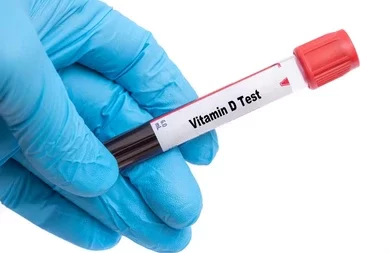Vitamin D Test
A vitamin D test measures the level of vitamin D in your blood to ensure that you have enough for your body to work well. Vitamin D is essential for healthy bones and teeth, and it also helps keep your muscles, nerves, and immune system working normally.Vitamin D helps your body absorb calcium and maintain strong bones throughout your entire life. Your body produces vitamin D when the sun’s UV rays contact your skin. Other good sources of the vitamin include fish, eggs, and fortified dairy products. It’s also available as a dietary supplement.
Vitamin D must go through several processes in your body before your body can use it. The first transformation occurs in the liver. Here, your body converts vitamin D to a chemical known as 25-hydroxyvitamin D, also called calcidiol.
Medintu provides a Vitamin-D test at home. Get treatment from top physicians without stepping out of your home. Medintu has partnered with ICMR and NABL-certified labs to offer different types of blood tests. Our testing services include counseling from our skilled medical specialists, guaranteeing that you receive private, trustworthy, and reasonably priced testing and treatment services for Vitamin-D

Fill out form to enquire now
Symptoms
Symptoms for vitamin d test
- Fatigue
- Bone pain
- Muscle weakness, muscle aches, or muscle cramps
- Mood changes, like depression
- Increased sensitivity to pain
Vitamin D Test Price
Why Choose Medintu?

9,40,000+
Blood Tests done

Believed By
Doctors

NABL & ICMR
Certified labs

Home Collection
Affordable Home Blood
Why Choose Medintu for a Vitamin-D Test?
If you are looking for a Vitamin-D test at home,your search ends here. Medintu is the best place for you. Medintu understands that it has become difficult for people to visit hospitals due to their hectic schedules. We strive to provide you with affordable and quality health care services. You can book an appointment with us to get specialized care without compromising your health. Here you can get the proper treatment to cope with Vitamin-D test.
How to prevent Vitamin D deficiency
Vitamin D is important as it stimulates calcium and phosphate absorption from the small intestine, stimulates the secretion of calcium into blood from bone, and also stimulates resumption of phosphate at the renal table. Recommended daily allowance for vitamin D is 600 international units per day. Vitamin D deficiency can be prevented by exposure to sun, taking egg yolks, beef liver, cheese, mushrooms, oily fish like salmon etc. Milk, soy drinks, orange juice and also good sources of vitamin D.
What is Vitamin D and Why is it Important?
Vitamin D, often referred to as the “sunshine vitamin,” is a fat-soluble vitamin that is essential for maintaining the health of bones and teeth, supporting the immune system, brain, and nervous system. It also helps regulate insulin levels and supports diabetes management, supports lung function and cardiovascular health, and influences the expression of genes involved in cancer development.

What are the Sources of Vitamin D?
Vitamin D can be obtained from three primary sources: sunlight, food, and supplements.
- Sunlight: The skin produces Vitamin D3 when exposed to ultraviolet B (UVB) rays from the sun. Approximately 10-30 minutes of midday sun exposure several times a week is usually sufficient, depending on skin type, location, and other factors.
- Food: Few foods naturally contain Vitamin D. These include fatty fish (such as salmon, mackerel, and sardines), fish liver oils, and small amounts in beef liver, cheese, and egg yolks. Some mushrooms provide Vitamin D2. Additionally, many foods are fortified with Vitamin D, such as milk, orange juice, and cereals.
Supplements: Vitamin D supplements are available in two forms: D2 and D3. These can be particularly useful for individuals who have limited sun exposure, dietary restrictions, or medical conditions that affect Vitamin D absorption or metabolism.
Popular lab tests near you in Hyderabad
Other Health Services in Hyderabad
At Home Health Services
X-ray at Home in Hyderabad / Ecg at Home in Hyderabad / Doctor at Home in hyderabad/ Injection at Home in Hyderabad/ Blood test at home
Physiotherapy at home in Hyderabad / Home Care services in hyderabad / Vaccination at home in Hyderabad / Ultrasound scan in hyderabad /Ct Scan in hyderabad
Medical Equipments for rent
Hospital Beds on rent in Hyderabad / Wheelchair on rent in Hyderabad / Walker on rent in Hyderabad / Oxygen Concentrator on rent in Hyderabad
FAQs
What is Vitamin D?
Vitamin D is a fat-soluble vitamin that is essential for maintaining healthy bones and teeth, supporting immune function, brain health, and regulating insulin levels. It can be obtained from sunlight exposure, certain foods, and supplements.
How common is Vitamin D?
Vitamin D deficiency means you don’t have enough vitamin D in your body. It primarily causes issues with your bones and muscles. Vitamin D is an essential vitamin that your body uses for normal bone development and maintenance. Vitamin D also plays a role in your nervous system, musculoskeletal system and immune system.
What are the symptoms of Vitamin D deficiency?
Symptoms of Vitamin D deficiency can include:
- Bone pain and muscle weakness
- Increased risk of cardiovascular diseases
- Cognitive impairment in older adults
- Severe asthma in children
- Increased risk of cancer In children, a severe deficiency can cause rickets, while in adults, it can lead to osteomalacia.
How much Vitamin D do you need daily?
The recommended dietary allowance (RDA) varies by age, sex, and life stage:
- Infants 0-12 months: 400 IU (10 mcg)
- Children 1-18 years: 600 IU (15 mcg)
- Adults up to 70 years: 600 IU (15 mcg)
- Adults over 70 years: 800 IU (20 mcg)
- Pregnant and breastfeeding women: 600 IU (15 mcg)
Can you get too much Vitamin D?
Yes, excessive Vitamin D intake can lead to toxicity, resulting in hypercalcemia (high levels of calcium in the blood), which can cause nausea, vomiting, weakness, and serious kidney problems. The tolerable upper intake level for adults is 4,000 IU (100 mcg) per day
